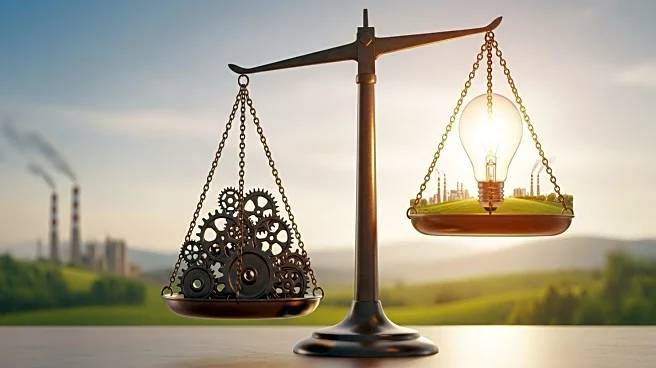What is the story about?
What's Happening?
Inflation could become a major issue in 2026, driven by rising food and electricity prices. President Trump's administration has imposed significant tariffs on imported food, such as a 17% tariff on Mexican tomatoes and a 50% tariff on Brazilian beef. These tariffs, coupled with deportations affecting farm labor, are expected to increase grocery prices. Additionally, the demand for energy is rising due to the growth of artificial intelligence, straining the electricity grid. The Trump administration's suspension of permits for renewable energy projects and elimination of investment tax credits further complicate the energy landscape.
Why It's Important?
The potential rise in food and energy prices poses significant economic and political challenges. Inflation affects consumer purchasing power and can lead to increased living costs, impacting households across the nation. The tariffs and energy policies may exacerbate these issues, influencing public opinion and political discourse. Democrats could leverage these economic concerns to propose policies aimed at reducing tariffs, supporting renewable energy, and addressing labor shortages. The focus on inflation and cost of living could become a pivotal issue in upcoming elections, shaping voter priorities and party strategies.
What's Next?
As inflation concerns grow, political parties may adjust their platforms to address economic challenges. Democrats might advocate for policy changes to mitigate the impact of tariffs and support renewable energy initiatives. The administration's approach to energy and trade policies will be scrutinized, potentially leading to legislative debates and public discourse. Stakeholders, including businesses and consumers, will need to navigate the evolving economic environment, balancing cost pressures with strategic planning.
Beyond the Headlines
The broader implications of rising inflation include potential shifts in consumer behavior and market dynamics. Ethical considerations around labor practices and environmental policies may gain attention, influencing corporate strategies and public advocacy. Long-term economic stability will depend on balancing growth with sustainable practices, highlighting the need for comprehensive policy frameworks.
















